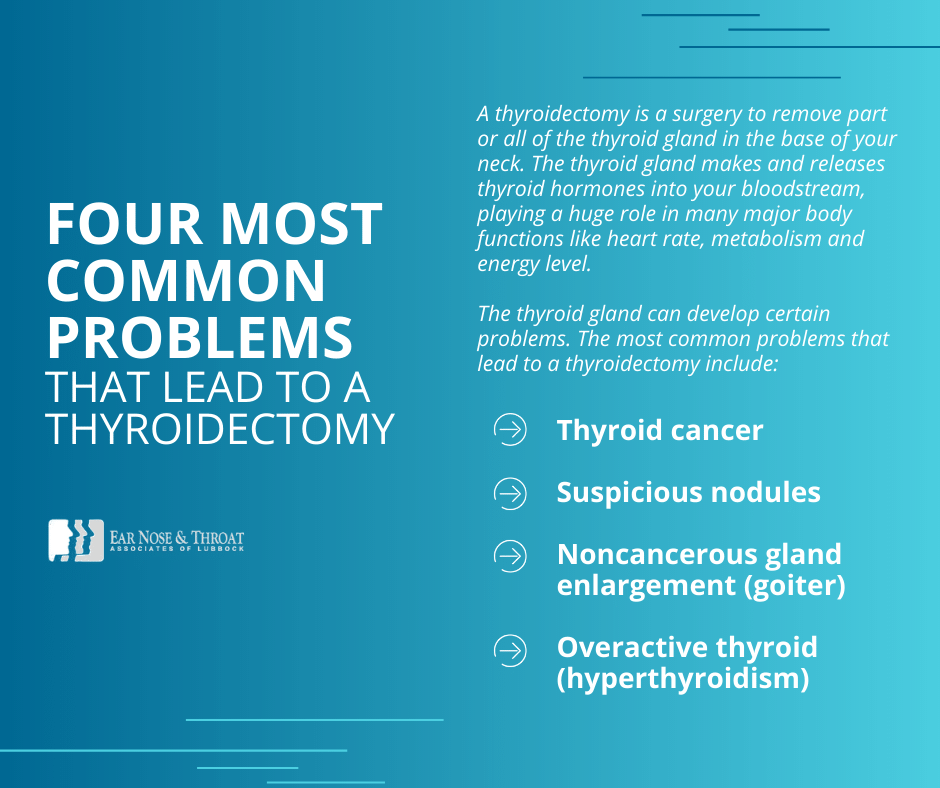Your Ultimate Thyroidectomy Guide (Written by a Surgeon)

If you’re searching for information about a thyroidectomy, you’re probably dealing with thyroid cancer, thyroid nodules, goiter or compression of your trachea. Or you might be experiencing the unpleasant symptoms that come along with an overactive thyroid.
Whatever your reason for researching a thyroidectomy, we want to provide you with all the facts you need.
What exactly is a thyroidectomy? What can you expect before, during and after the procedure? And what if you’re nervous about having a thyroidectomy?
You’ve come to the right place.
What Is a Thyroidectomy?
A thyroidectomy is a surgery to remove part or all of the thyroid gland in the base of your neck.
The thyroid gland sits in front of your voice box and is shaped like a butterfly, with two lobes connected in the middle. It makes and releases thyroid hormones into your bloodstream, playing a huge role in many major body functions like heart rate, metabolism and energy level.
The thyroid gland can develop certain problems. The most common problems that lead to a thyroidectomy include:
- Thyroid cancer.
- Suspicious nodules.
- Noncancerous gland enlargement (goiter).
- Overactive thyroid (hyperthyroidism).
There are two types of thyroidectomies. A total thyroidectomy removes the entire thyroid, while a thyroid lobectomy or partial thyroidectomy only removes part of the thyroid. Which procedure you have depends on what the reason for the surgery is.

What To Expect Before, During and After Your Thyroidectomy
Preparing for Your Thyroidectomy
We always encourage our patients to research potential surgeries or treatments ahead of time. But as far as physical preparation for a thyroidectomy, there isn’t much you need to do beyond what’s typically recommended for any surgery involving general anesthesia.
You’ll be instructed not to eat or drink anything after midnight the night before your procedure. This is to prevent any food or liquid from coming up and getting into your lungs while you’re under anesthesia, a problem called aspiration. While aspiration is rare, refraining from eating and drinking before surgery can eliminate the risk almost entirely.
You should take a shower and wash your body with antibacterial soap before your surgery. Pay special attention to washing your neck, although your surgeon will make sure your skin is thoroughly disinfected before beginning your thyroidectomy.
Also make sure your surgeon has a thorough picture of your medical history, especially any previous cardiac procedures or history of blood clots. If you’re on a blood thinner, you’ll need to get clearance from your prescribing doctor to stop your medication before surgery.
The Day of Your Thyroidectomy
After you arrive at the surgery center, you’ll be brought back to the preoperative area. A nurse will start an IV in your hand or arm. You’ll have a conversation with your surgeon, anesthesiologist and nurse. Then you’ll receive anesthesia.
After that, you probably won’t remember anything at all!
The length of a thyroidectomy procedure depends on the size of the thyroid and how much is being removed. Experienced, high-volume thyroid surgeons usually take between one and two hours, but family members shouldn’t worry if it takes slightly longer.
Recovering From Your Thyroidectomy
Most thyroid surgeries take place in an outpatient surgery center. Patients have the procedure in the morning, stay several hours for monitoring after the procedure, and then return home in the afternoon. We typically see patients the next morning in our office to make sure there are no complications.
When you wake up from the procedure, you’ll have Steri-Strips over your surgical scar, which will be small and sutured beneath the skin. You may also have a drain at the surgical site depending on the extent and type of surgery. If so, the drain will be removed the following day.
You’ll be able to take a shower 24 hours after your procedure. When showering, avoid direct pressure from your showerhead on the incision site. You may gently wash the area with soap, but don’t scrub at the incision or any remaining glue. This will fall off naturally over the following week.
You might find that your throat is sore after surgery, not from the thyroidectomy itself but from being intubated. If that’s the case, you can stick to soft food for a day or two to avoid discomfort.
After a total thyroidectomy, your body will need a new source of thyroid hormone. Fortunately, thyroid hormone replacements are widely available and inexpensive. You’ll leave the surgery center with a prescription for a thyroid replacement like Synthroid, generic levothyroxine or Armour Thyroid. Then you simply take your prescribed dose every day.
After a partial thyroidectomy, about one in four patients need thyroid hormone supplementation. Your doctor will work with you to determine whether you need this or not.
You’ll need blood work about six weeks after your surgery to ensure you’re getting the right amount of thyroid hormone. Finding the right dose can take a bit of time and finagling, so don’t worry if your physician adjusts your dose a few times before finding the right level for you.
Sometimes after a thyroidectomy, your parathyroid glands don’t function properly for a few days. The most common result of this is transient hypocalcemia, a short-lived reduction in the calcium in your blood. We recommend that our patients take Tums for a few weeks to make sure their calcium levels stay within normal range.
Nervous About Having a Thyroidectomy?
One of the most important decisions you can make before scheduling a thyroidectomy is to choose an experienced surgeon you trust. Ask them plenty of questions about the procedure. Discuss the risks and benefits of surgery, and ask whether they would suggest any alternatives.
Being nervous before having surgery is very normal. The surgeons at ENT Associates of Lubbock have a great deal of experience performing thyroidectomies. We won’t suggest you have surgery unless it’s absolutely medically necessary. And we’ll do everything we can to set your mind at ease!
Dr. Cuthbertson is a physician at Ear Nose & Throat Associates of Lubbock. He joined the team at ENT Lubbock from Houston, where he was chief resident of the prestigious Bobby R. Alford Department of Otolaryngology at Baylor College of Medicine. He is board certified in Otolaryngology and Head & Neck Surgery and has quickly built a reputation, not only as an extremely skilled surgeon, but as an approachable and compassionate clinician adept in the newest standards and technologies. Learn more about Dr. Cuthbertson.
Categories:








